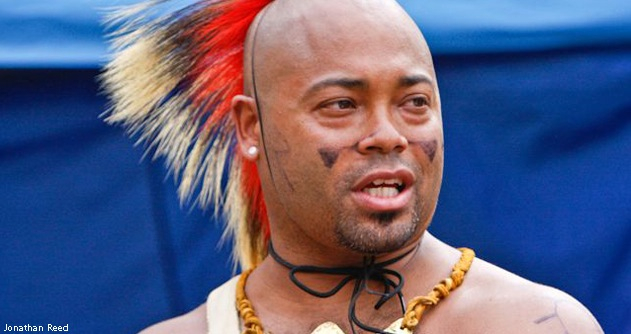Tribal Elder Hazel Currence and Troy Currence Medicine Man of the Herring Pond Wampanoag share some words with Eryn Dion…This is America: A not-so-happy Thanksgiving
November 27, 2020

Eryn Dion USA TODAY
https://www.usatoday.com/story/news/2020/11/26/america-not-so-happy-thanksgiving/6355189002/
It’s Thanksgiving. Have you watched “A Charlie Brown Thanksgiving” yet? Perhaps the seasonal episode of “The Simpsons”? We got you early? Good. Time to hit pause.
Welcome to the “This is America” newsletter centered on race, identity and how they shape our lives. I’m Eryn Dion, a journalist based in New England, a region known to unapologetically tout its place in American history.
This year marks the 400th anniversary of the Pilgrims’ arrival on the shores of New England, the establishment of the Plymouth colony and – what we’ll focus on here – the beginning of the founding myth of our country and erasure of a Native American perspective in U.S. history.
What myth am I talking about? You know, happy Pilgrims and Native Americans coming together peacefully to feast from gourds ‘o plenty, breaking bread in mutual gratitude. We know it’s not true. And yet generation after generation, it continues to be told.https://a65aa3e17b8c3ac3d9f79c4aedb09789.safeframe.googlesyndication.com/safeframe/1-0-37/html/container.html
After all, what could be the harm in retelling a feel-good story?
But first, race and justice news we’re watching
Important news from the past week, from USA TODAY and other news sources.
- Racism is a declared public health issue in 145 cities and counties across 27 states. Now what happens?
- Benjamin Crump demands justice after a Florida deputy shot two Black teens. Here’s what we know
- Grammy nominations show Recording Academy has made progress on diversity goals – but not enough
- On 88 acres of self-governed land in Tennessee, a dream deferred for Choctaw people comes true
It’s time to flip the script on Thanksgiving
I am not Native American myself, but I recently had the opportunity to speak to several members of the Mashpee and Herring Pond Wampanoag tribes as part of a project examining the Plymouth Thanksgiving’s history and legacy.
How has the the myth of the Pilgrims and Thanksgiving impacted generations? Is America really ready to reckon with its colonialist past?Get the Coronavirus Watch newsletter in your inbox.
Stay safe and informed with updates on the spread of the coronavirusDelivery: VariesYour Email
For this Thanksgiving edition of “This is America,” I’ll let some of my most impactful interviewees speak for themselves:
What’s the harm in continuing to repeat and teach this myth?
On identity:
“It comes down to self identity. Understanding history and the way it happened allows people to be more compassionate in the decisions that are made and how things move forward. People don’t realize that we continue to have these roadblocks – generation after generation of assimilation and poverty and low income, after this genocide. It continues to perpetuate itself.” – Steven Peters, spokesperson for the Mashpee Wampanoag Tribe
On the value of life:
“No one has acknowledged that atrocities happened. Take a look at King Philip’s War, the most deadly war to take place on American soil until the Civil War. Yet when we talk about it, there’s zero empathy. Or it’s about how many colonists were killed. The native life doesn’t hold the same value. I think if we can get people to come to terms with the history and the way it happened, they can start to look at Native American lives on the same plane as European lives.” – Peters
On a family history different from the textbooks:
“When I look at American history, everything I was taught in school contradicted stories I was told by my grandfather. A lot of things are skipped over, and they were a lot of important things done by minority people. They, those communities, know some of the history, but it’s not available for the rest of Americans. To the victor goes the spoils. They (descendents of European settlers) get to tell the history, and a lot of it is incorrect.” – Troy Currence, medicineman for the Herring Pond Wampanoag Tribe

What do you wish people knew about this false history and the impact it had on your people?
‘We weren’t savages’:
“For strangers to come and be able to take over our land, and our way of life, to think that we wouldn’t try to protect our way of life and our families? We were enslaved people. I think of our ancestors, and when you look back, how they must have struggled to really survive, hoping we would band together. We weren’t savages. We were human beings who lived here, and all over the country.” – Hazel Currence, elder of the Herring Pond Wampanoag Tribe:
On assimilation and ancestral trauma:
“My grandfather, he used to speak the language. It wasn’t really cool to speak Wampanoag back then. You were shipped off to boarding schools where they cut your hair and didn’t let you speak your language or practice your culture. Our way of life was outlawed to us. Personally for me, I never really went to Plymouth. Plymouth never really sat well with me. It wasn’t until about 15 years ago, that I got over that and was able to go. I didn’t realize it at the time, but that’s ancestral trauma.” – Troy Currence